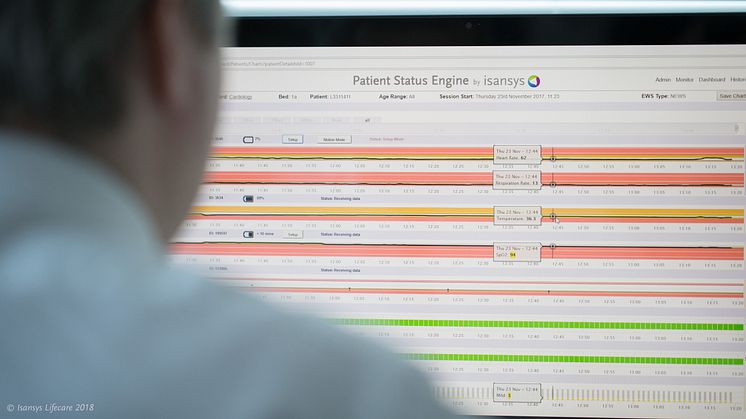
News -
Available Now - New data driven approach to healthcare
Isansys Lifecare Ltd has today launched its second generation wireless vital signs monitoring system which will address critical patient safety issues and improve patient monitoring and alerting both in hospital and at home.
The Patient Status Engine (PSE) is an innovative, continuous vital sign acquisition, analysis and prediction platform which provides real-time, low cost, high resolution monitoring of patients in hospital, and creates new applications and care pathways through data-driven physiological biomarkers, for example, the early detection of sepsis in chemotherapy patients at home.
This new technology is already being used as part of a ground-breaking project at Birmingham Children’s Hospital which aims to predict deterioration in seriously ill children.
Dr Heather Duncan, a consultant at Birmingham Children’s Hospital’s Paediatric Intensive Care Unit and leader of the project, called RAPID (Real-Time Adaptive & Predictive Indicator of Deterioration), today hailed the new system as a ‘game changer’ in healthcare.
She said: “This technology is truly transformational. It allows us to analyse many more patients’ data in real-time for the first time in the same way that various other high-risk industries have done for years. The ability to track and identify deterioration towards a cardiac arrest will give doctors the chance to save the patient’s life. I genuinely believe that this will change the way we care for patients in hospital forever.”
The PSE2 provides a complete end-to-end platform to continuously and wirelessly capture, collect, interpret and securely story vital sign and other physiological data. The class IIa, CE marked platform uses the Isansys Lifetouch™ “smart bandage’ technology, the Lifetemp - a first-of-its-kind, wireless thermometer, and other unobtrusive wireless wearable sensors to collect data directly from the patient. The system then analyses the ECG of every heartbeat to provide continuous heart rate, respiration rate, heart rate variability, oxygen saturation, and temperature.
Vital signs are normally recorded every one to four hours onto paper charts, but the PSE2 enables continuous monitoring and analysis of large amounts of data in real time. This enables clinical staff to monitor and know the status of their patients at all times both in hospital and at home.
The PSE2 also provides early warning indicators of adverse events and many serious conditions, for example sepsis – a life threatening whole body infection, by analysing subtle changes in a patients’ vital signs. This ensures a more accurate prediction of a patient’s deterioration, which is expected to lead to faster and more targeted responses that can save lives and shorten hospital stays.
Keith Errey, CEO of Isansys, said: “Continuous, real-time monitoring has an important role to play in a ‘patient-focused’ health care system. At Isansys, we have developed the PSE2 to provide clinicians with robust, accurate and relevant data which will give them new insights into their patients’ health, provide them with timely early warning indicators both in hospital and at home, and enable them to spend more time caring for their patients.
“We are currently working with a number of hospitals in the UK and India to help provide better care for patients in hospital and those recovering at home. With the PSE2, Isansys is helping clinicians and nurses to improve patient outcomes, increase efficiency and lower costs. We are also helping them to better address crucial patient safety issues: to reduce the number of avoidable deaths and adverse events in hospital, reduce lengths of stay, and enable new pathways to keep patients out of hospital in the first place.”
Isansys’ first generation PSE was introduced in 2012 when Isansys won two Small Business Research Initiative (SBRI) Healthcare Phase 1 development contracts. In Dec 2014, Isansys was awarded a £1million Phase 2 contract to increase the functionality and extend the intended use of the PSE. This was part of a joint Innovate UK and NHS England initiative to enhance the adoption of innovative devices and new technologies.
To find out more about Isansys’ second generation system, or to book a free demonstration, please log into www.isansys.com or call 01235 436225.
Notes to Editors:
Alongside this release, Isansys has announced more details on the first patient supported with real-time monitoring at the Birmingham Children’s Hospital as part of the RAPID project. For more details see here.
Photos and interviews available on request